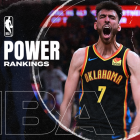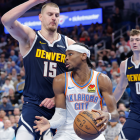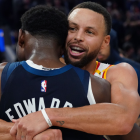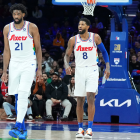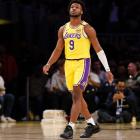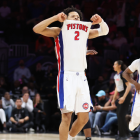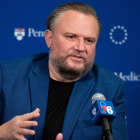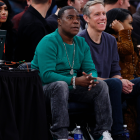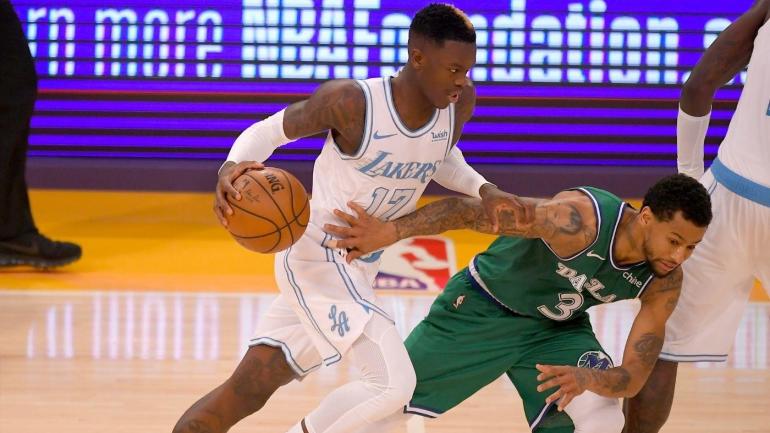
The Lakers acquired Dennis Schroder for two reasons. The short-term purpose of the deal was to add some sorely needed ball-handling. The pre-bubble Lakers were 8.1 points worse per 100 possessions offensively when LeBron James went to the bench, and even when he was on the floor, they relied on him for shot-creation to an uncomfortable degree. The Sixth Man of the Year runner-up has held up his end of the bargain so far in scoring an impressive 32 points on 12-of-26 shooting to go along with 14 assists through two games.
But the Lakers targeted Schroder specifically over bigger names like Chris Paul and DeMar DeRozan in part because of what he can do after LeBron's contention window closes. Schroder is only 27. When this team inevitably shifts towards Anthony Davis, it is going to need a long-term starting point guard. The Lakers are hoping that can be Schroder. All they have to do to ensure that it will be is sign him to a contract extension.
That's where things get a bit tricky. The Lakers offered Schroder a two-year, $33.4 million contract extension before the season, according to ESPN's Adrian Wojnarowski. He declined for an entirely predictable reason: even if the Lakers had wanted to offer him more than that, a quirk in the Collective Bargaining Agreement prevented them from doing so... at least at that particular moment.
The CBA includes a provision for extend-and-trade agreements, whereby players sign an extension with their original team, but are then traded to a new one as a simultaneous move. Those extensions are extremely limited in what they can grant the player in question: the new contract cannot exceed three years (including the current one), the first year of the extension can only include a five percent raise on the player's previous salary, and the subsequent year can only offer another five percent on top of that.
It also allows teams to give extensions to players they already had, so long as certain criteria are met. In Schroder's case, he was eligible for an extension two years after signing his original deal, a date that has long since passed. The catch here is that this type of extension is significantly more lucrative than the ones outlined by the rules governing extend-and-trade agreements. The first year can include a raise of up to 20 percent on the player's previous salary, subsequent years can add eight percent raises on top of that, and the deal can last five total seasons rather than three, including the season in which it was signed.
This is where the problem arises. The CBA does not allow teams to circumvent those extend-and-trade limitations by trading for a player and extending him at a higher rate after the trade has been consummated. Under normal circumstances, it stipulates that the team in question cannot extend a player beyond those limits until six months after acquiring him through trade. As this season and the offseason Schroder was traded in were shortened due to COVID-19, that timeline was tweaked. Now, Feb. 16 is when those restrictions drop.
That amounts to nearly $50 million more that he can guarantee himself by waiting another month-and-a-half. Here's a look at what the two extension options could pay him, starting with the one he can ink now.
Year | Salary |
2020-21 | $15,500,000 |
2021-22 | $16,275,000 |
2022-23 | $17,088,750 |
New money | $33,363,750 |
Total | $48,863,000 |
And here's the one he can sign on Feb. 16, with that 20 percent bump in the first season to go along with two extra years and eight percent annual raises:
Year | Salary |
2020-21 | $15,500,000 |
2021-22 | $18,600,000 |
2022-23 | $20,088,000 |
2023-24 | $21,576,000 |
2024-25 | $23,064,000 |
New money | $83,328,000 |
Total | $98,828,000 |
There was some degree of risk for Schroder in turning down that offseason offer. It forced him to play the first two months of the season without any security. Had he gotten injured, he wouldn't have that $33.4 million in the bank, or if his fit with the Lakers had proven poor, they may have either forced him to earn another offer over the course of the season or traded him to a less appealing team and made him audition for a new deal there. But assuming he lasts the next two months at something like his current level of production, he'll become eligible for that extra $50 million in guarantees. The upside significantly outweighed the downside, so he waited.
Now, this is where the second twist comes into play. Just because the Lakers can make Schroder that $83.3 million offer in February doesn't mean that they will. That is the most that they can offer him, but they could also offer him a number between their original $33.4 million and that figure. Even if they make their highest possible offer, there is no guarantee that Schroder takes it.
Schroder probably isn't going to get an offer greater than $83.3 million in free agency next season, but it's not an idea that can be dismissed out of hand. After all, all restrictions related to his previous contract fly out the window the moment free agency begins. He can sign for anything up to his max. With another team, under a projected $112.4 million cap, that max would be approximately $145 million over four years, or $195.6 million over five seasons from the Lakers.
Obviously, no team is giving Schroder the full max, but if he wants to bet on himself yet again, there are incentives for waiting even longer. After all, next season's free-agent class looks very weak after a number of offseason extensions, yet it is still expected to be a very friendly cap environment for players. After all, the teams that were saving space for Giannis Antetokounmpo or Rudy Gobert still have that space, and they're going to spend it on somebody. It's unlikely, but not impossible that Schroder could squeeze one of those teams for somewhere between $90-$100 million. Fred VanVleet just got $85 million. He's a better player than Schroder, but signed under far less favorable conditions.
More likely, waiting until the offseason would be a bet on his ability to convince the Lakers to give him a fifth year. Remember, while extensions can last up to five years in total, that includes the year in which the extension was signed. If he wants five new years, he has to wait until the offseason. That is his only path to guaranteed money in the 2025-26 season.
Still, any possible gains by taking this approach would be meager, and realistically, he probably won't get offered any more than than $83.3 million the Lakers can put on the table in February. That makes the likeliest outcome by far an extension on or after Feb. 16 at something approaching $80 million.
Both sides would benefit from a quick agreement. Schroder would protect himself against possible injury or playoff ineffectiveness. He'd also have peace of mind in case the Lakers need to change his role. Schroder has started in each of his two games as a Laker, and he indicated before the season that he wants to do so all season. But the playoffs are about matchups, and if the Lakers need to prioritize shooting or defense, they can now do so without Schroder worrying if a bench role would cost him money in free agency.
If Schroder sustains his opening-week performance, the Lakers can feel comfortable in the fact that he has filled their short-term hole at ball-handling. At that point, it's up to them to make sure he can fill their long-term hole at point guard by giving him the contract he's earned on the court.
![[object Object] Logo](https://sportshub.cbsistatic.com/i/2020/04/22/e9ceb731-8b3f-4c60-98fe-090ab66a2997/screen-shot-2020-04-22-at-11-04-56-am.png)










